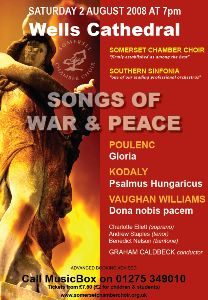



|
|
About |
Concerts |
|
|
|
|
|
www.somersetchamberchoir.org.uk © 2011 Somerset Chamber Choir Registered Charity No.1003687
Patrons: Dame Emma Kirkby and Sir David Willcocks




Sign up for concert updates
Enter your email address here to receive concert details
by email
|
Works: |
Poulenc Kodaly Vaughan Williams |
Gloria Psalmus Hungaricus Dona nobis pacem |
|
Performers: |
Somerset Chamber Choir Southern Sinfonia Charlotte Ellett Andrew Staples Benedict Nelson Graham Caldbeck |
Soprano Tenor Baritone Conductor |
Review:
Vaughan Williams's 1936 'Dona Nobis Pacem' opened the programme. This work combines the familiar Latin text with poems by Walt Whitman and other biblical verses, to convey not only the senselessness and loss of war but the peace and hope that it can bring.
I have to say that I found the vibrato of the soprano soloist Charlotte Ellett too obtrusive for my personal taste, but she sang her part with feeling and musicianship. The chorus articulation throughout was first rate, and their attention to the dynamics was better than the orchestra's in places.
At first I thought that the baritone, Benedict Nelson was just a little under-
The fifth section is probably the most complex chorally, and the chorus made a full-
After a short interval came Kodaly's 'Psalmus Hungaricus', premiered in 1923. The
exciting orchestral opening was followed by a truly gorgeous unaccompanied chorus
entry. From his opening notes, tenor Andrew Staples gave us a truly superb rendition
of the solos in this work. His fine, ringing tone was matched by the passion and
emotion he brought to the music, and this was a performance to treasure. You might
think that singing 'Ah' repeatedly is easy -
Poulenc records that writing his 'Gloria' gave him a lot of trouble, and it is a
rather odd work in places. The balance between orchestra and chorus was not good
at the start, making the choir sound a little unfocussed. The playful 'Laudamus
Te' was a bit leaden-
The weird intervals Poulenc wrote for the soprano in the 'Dominus Deus, Agnus Dei' were not only well handled by Charlotte, but beautifully contrasted by really lovely singing by the chorus of the more 'conventional' harmonies in the responses. A glorious entry by the tenors in the 'Qui Sedes' followed by the whole choir letting rip set us up for a really lovely ending to the work and to the whole evening.
This was music making of a very high order. All of the forces acquitted themselves with honour, and Graham's firm control of everything was evident throughout. He and his choir can justifiably be proud of what they achieved. It was a performance which obviously delighted the audience, and rightly so.
Harold W. Mead
Saturday 2 August 2008
Wells Cathedral
‘Songs of war & peace’
Last Saturday in Wells Cathedral, the Somerset Chamber Choir and the Southern Sinfonia,
conducted by Graham Caldbeck presented a concert of the highest standard entitled
"Songs of War and Peace". At first sight a mixture of Vaughan-
